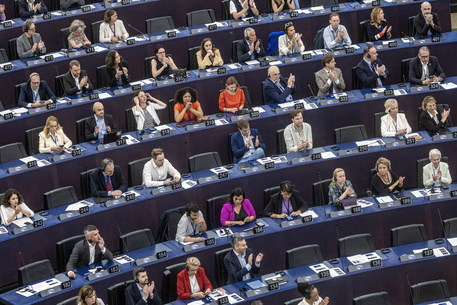(ANSA) - ROME, JUL 17 - Far-right remains splintered.
In addition to the Hungarian Fidesz and the French RN, the PfE
group also includes Italy's Lega, Spain's Vox, the Dutch Freedom
Party (PVV), the Danish People's Party, the Portuguese Chega and
the Belgian Vlaams Belang. It also includes other MEPs from the
Czech Republic (Oath and Motorists), Latvia (Latvia First) and
Greece (Voice of Reason), as well as a satellite party of the
Hungarian Fidesz called KDNP.
But in the EU legislature, the far-right remains fragmented -
with far-right and Eurosceptic parties separating themselves
between different groups.
Previously, the biggest Eurosceptic faction was the ECR,
dominated by the Brothers of Italy (FdI) party of Italian Prime
Minister Giorgia Meloni, who has toned down her previous
euroscepticism in power. The other was the Identity and
Democracy (ID) group - which does not exist any longer -
previously dominated by the French RN and which took a more
anti-EU stance.
In Belgium, for example, the far-right anti-immigration and
nationalist party Vlaams Belang joined the PfE group. The party
won the most votes in the European elections and secured three
seats in the European Parliament.
But Belgium also held federal elections simultaneously, in which
the nationalist party New Flemish Alliance (N-VA) won the most
votes. In the European Parliament, N-VA decided it would remain
in the European ECR group.
In Poland, the far-right Konfederacja alliance split in two:
three of the country's six elected MEPs have joined the ESN
group, while two others are negotiating to join Viktor Orbán's
Patriots.
Slovenia and Slovakia enter fifth legislative cycle.
In Slovenia and Slovakia, MEPs appear to remain most numerous in
the parties of the centrist coalition.
During the new term of the Parliament, Slovenia will have nine
MEPs: five for the EPP, one for the S&D, two for Renew and one
for the Greens. For the first time since 2004 when Slovenia
joined the EU, a Slovenian MEP will be one of the vice-chairs of
the EPP Group. Another Slovenian MEP will be vice-chair of the
Renew group.
Slovakia, however, will have the weakest representation in the
EPP group since its accession to the EU in 2004. Out of 15 MEPs,
only one will be in the EPP, six will join the Renew group, one
will join the new ESN group and the remaining seven will be
non-attached.
In the previous four cycles of Slovakia's presence in the
European Parliament, Slovaks had been the most numerous in the
EPP fraction. In the first cycle from 2004 to 2009 Slovakia had
eight MEPs out of 14 in the EPP. In the previous cycle from 2019
to 2024 there were first five, then four out of 14.
What's next for the new European Parliament?.
As war rages on Europe's doorstep, the bloc faces multiple
challenges including a stagnant economy and growing global
uncertainty, which EU leaders and MEPs alike will have to
confront head-on after their election.
But all eyes will be on Thursday's vote when lawmakers decide
whether to give Ursula von der Leyen another five years as
Commission chief, seen as the most powerful role in the EU.
Since EU leaders struck a hard-fought deal on her candidacy in
late June, von der Leyen has been scrambling to win over
lawmakers in the main political groups.
To secure the mandate, the German conservative needs at least
361 votes in the 720-seat chamber. It could be a tight race - in
2019, she secured the post by only nine votes.
(The content is based on news by agencies participating in the
enr, in this case AFP, ANSA, APA, Belga, CTK, dpa, EFE, Lusa,
PAP, STA, Tanjug, TASR). (ANSA).
EU Parliament convenes as new far-right groups enter (2)
First plenary session since June's European elections
